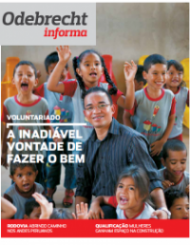Edition 168 – A major triumph for the community
Know the Project named Youth Protagonism, formed by eight young students of Southern Bahia Lowlands
31 de October de 2013
Know the Project named Youth Protagonism, formed by eight young students of Southern Bahia Lowlands
31 de October de 2013

written by Gabriela Vasconcellos
photos by Élcio Carriço
The idea came suddenly, in a dream, and stuck in José Renildo Correia’s head. The nineteen-year-old resident of the São Benedito community in Nilo Peçanha county, Bahia, understood it was time to start a volunteer project to contribute to the development of his home region. But he couldn’t do it alone. “I contacted some young people so we could build it together,” he says.

That is how the Youth Protagonism project was born, bringing together eight young students from the Agroforestry Family House (CFAF) – a teaching unit connected to the Development and Integrated Growth Program with Sustainability for the Southern Bahia Lowlands Environmental Protection Areas Mosaic (PDCIS), supported by the Odebrecht Foundation in partnership with national and international private and public institutions. The group’s main environmental awareness initiatives include lectures, seminars and reforestation projects for degraded areas.
“We know that our county has a vast expanse of forests. Oftentimes, the community doesn’t use natural resources as well as it could, and that is our goal: to help them practice sustainable management,” explains volunteer João Victor Moreira, 15, who also lives in the area.
According to Rafael Alves, 16, the knowledge the volunteers are applying and sharing with the project’s target audience was acquired at the CFAF. “We always discussed the need to carry out projects in the community. The Family House taught us that it is our duty to help others. Previously, I couldn’t speak in public. Today, I give lectures,” he says.
During their first year together, they have involved more than a thousand people, planted 210 acacia seedlings and cleaned up the Peixe River, which runs through the São Benedito community. To achieve all this, they needed to get partners on board. They already have seven supporting the initiative, including a radio station and the local government, as well as the CFAF itself. “We invite people who can make a contribution. With their help, the project can grow, develop and expand,” observes Laysa Ferreira, 15.
They are already thinking about expanding. According to Samuel Melo, 15, the aim is to set an example for other communities. “We want to garner recognition for our work throughout the Southern Lowlands,” he says. José Renildo adds: “We are starting to work towards that goal. We are already active in the urban area of Piraí do Norte, a nearby county. It is a way to take care of the environment we live in, while spreading knowledge.” The third location they chose is the São Francisco community, also in Nilo Peçanha, which is home to Juliana Neves, 15, the only group member who does not live in São Benedito.
“We seek to encourage young people to stay in the countryside. It’s vitally important because that’s where we grow our food. We want to help stop the rural exodus,” adds João Victor dos Santos, 14. According to Patrícia Nascimento, 15, the group is motivated by the good their work is doing for the region. “We don’t worry about making a profit, and we don’t just think about ourselves. Our priority is the community.”
After taking part in this process, José Renildo, recognized as one of the group members who keep the project running smoothly, could not have imagined where a simple dream could lead. Today, he is sure that dreams are meant to be acted on. “The São Benedito community was the first step. Our expectation is that everyone will keeping giving their all and doing their best. That way, we’ll go far,” he says.
Encouraging volunteer work
To encourage volunteer work in the Southern Bahia Lowlands, the Rights and Citizenship Institute, which is also part of the PDCIS, organizes the Treading Paths project. Its participants, who must be between 14 and 18 years of age, have a chance to expand their knowledge about themselves and other social issues and develop leadership skills, as well as to learn and master the tools of information technology. The conceptual basis of this initiative was partly inspired by the book Juventude, Solidariedade e Voluntariado (Youth, Solidarity and Volunteering) by Vilma de Souza, published in 2004 with the support of the Odebrecht Foundation.
The educational process lasts two years, and youth protagonism is encouraged from the start. The young people have to identify a need in their local community and help minimize it. For example, Jamiles Souza, 17, and her group decided to conduct playful workshops with children in a daycare center in Tancredo Neves, Bahia, where she lives. “The aim is to address important issues for the school environment, such as bullying, through games and recreational activities. We have brought together over 200 children,” she says.
Luciene de Souza, 15, decided to alert her community about the dangers of dengue. “At first we thought about mobilizing a neighborhood, and in the end, we worked with three. We did it in partnership with health clinics, explaining the risks for local residents,” she says. Luciene, who dreams of becoming a pediatrician and taking care of children in her community, believes that she will never forget her experience with Treading Paths. “In life, you can take everything away from a person except the knowledge they have acquired.”
Do you wish to be
a partner in our projects, make
a donation or hire our technical consulting?
Send a message
right now!